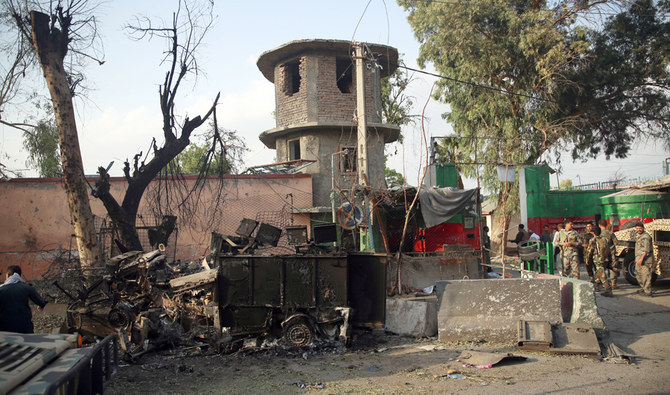KABUL: Militants affiliated with the Daesh group stormed a prison in eastern Afghanistan in a daylong siege that left at least 39 people dead, including the assailants, and freed nearly 400 of their fighters before security forces restored order, a government official said Monday.
The attack on the main prison in Jalalabad, in Nangarhar province, where several hundred Daesh fighters have been detained, began on Sunday afternoon with a car bomb detonated at the entrance to the jail.
The attack came hours before the end of a three-day ceasefire between the Afghan government and the Taliban, who immediately denied any involvement in the assault. Several Western media outlets reported that the Daesh had claimed responsibility.
The Nangarhar governor’s spokesman, Attaullah Khogyani, told Arab News that there was still gunfire on Monday morning, and that more than 20 civilians and personnel and three attackers have died in the fighting.
Two local security sources speaking on condition of anonymity said that nearly half of the prison’s 1,500 inmates managed to flee.
They said 20 assailants made their way into the prison and a number of explosions were heard from inside the jail.Residents said one group of attackers was firing on the jail from a nearby building and they reported heavy and sustained exchanges of small fire.
According to Khogyani, most of the escapees have been caught. He gave no further details about the attack.
The assault comes amid official claims that Daesh leaders have been arrested or killed in recent months, notably in Nangarhar, which used to be the group’s bastion.
“This is a major embarrassment for the government, which every now and then claims to have wiped out or paralyzed the Daesh. The government needs to answer why such a high security lapse has happened,” analyst Shafiq Haqpal said.
The Eid Al-Adha ceasefire between the Taliban and Afghan government forces was a part of efforts to begin long-awaited peace talks following a US-Taliban agreement signed in Qatar in late February.
In accordance with the deal, the Taliban is releasing 1,000 Afghan troops in exchange for 5,000 militants held by President Ashraf Ghani’s government.
The process is near completion, but Kabul is refusing to free 400 remaining Taliban inmates, saying they have been behind “heinous crimes.”
After Eid prayers on Sunday, Ghani announced he would summon a traditional grand assembly, Loya Jirga, to help him decide whether the rest of Taliban prisoners should be freed.
The assembly is scheduled to start on Aug. 7. Loya Jirga has deep roots in Afghan history and tradition and is usually summoned during times of crisis or emergency.
The Taliban have voiced their opposition to the convocation of the jirga. Their Qatar-based spokesman, Suhail Shaheen, told TOLO News that Kabul’s decision would only complicate the peace process.
Afghan politicians are divided on the jirga announcement. Hamidullah Tokhi, a member of parliament from southern Zabul province, said: “The nation and parliament have deep doubts about Ghani’s goal for summoning the jirga to decide over the fate of 400 Taliban.
“All of the 4,500 Taliban already freed were involved in some sort of bloody attacks. Why did the government not ask for the jirga on the overall release of the Taliban?”
“Summoning the jirga now is a treason to this country and a clear blocking of the peace process,” he said.
Torek Farhadi, who served in the previous government as an adviser, said Ghani hopes that the victory of Democrats in the upcoming US elections, would sideline Zalmay Khalilzad, the US special envoy for Afghanistan who struck the Qatar deal with the Taliban, allowing Kabul to be in charge of the peace process.
“We should have one Loya Jirga to discuss substantive matters on peace with the Taliban and the type of future regime,” Farhadi said, adding that the Taliban, too, should participate in the assembly. “This meeting would be like a half-baked national dialogue (if it is) conducted by only one side of the conflict.”
























